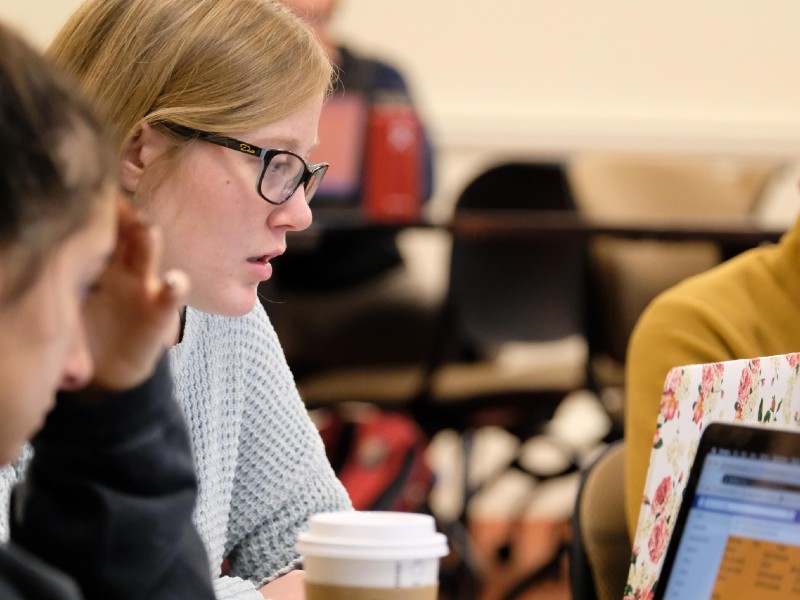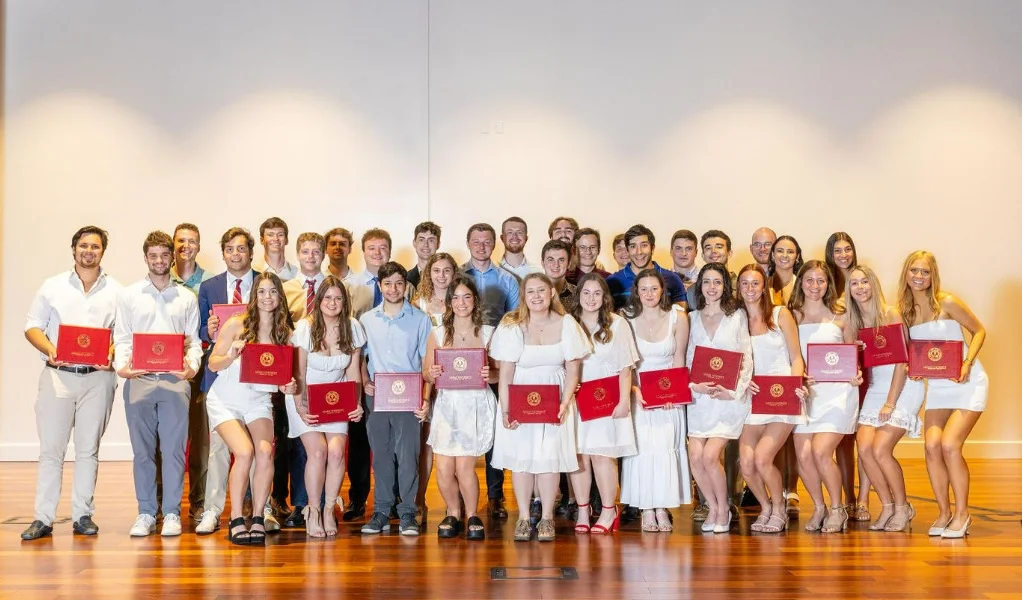30
Credit Hours

We offer two Master of Accountancy (M.Acc.) program tracks: a Combined B.S./M.Acc. program that can be completed in just four years or a traditional five-year M.Acc. program. We limit enrollment to 50-55 outstanding applicants, which allows us to focus on the close-knit community of scholars and professors developed through our program. We prepare you for leadership roles in a broad range of careers, including public accounting (audit and tax), consulting, business risk services, business valuation, forensic accounting, investment banking, and systems and process assurance. For more information, please contact Amanda Pyzoha at MiamiMAcc@MiamiOH.edu.
30
Credit Hours
Jan. 1
Application Deadline
50 - 55
Students
100%
Placement Rate for Master of Accountancy Graduates
The combined Bachelor's and Master's accountancy program offers students a unique and accelerated path to graduation, equipping them with the skills and knowledge necessary for a successful career.

Students planning to take the CPA exam in Ohio and in most other states are required to have 150 hours of education with at least a bachelor's degree. This requires additional education beyond the requirements for a bachelor's degree from Miami.
High-achieving students have the option of pursuing a combined degree program in which you can earn both your bachelor's and master's degrees in Accountancy.
After completing the program, you are qualified to sit for the CPA examination in the state of Ohio and most other states.
The fourth (or fifth) year of study for students in the combined program will be the full (30 semester hours) MAcc curriculum; as such, the Department of Accountancy will treat applicants to the combined program as "early admit" candidates. Candidates must be able to be full-time students during the fourth (or fifth) year.
Note: The M.Acc. curriculum may include ACC 522, ACC 553, and/or a Capstone course for combined degree candidates. These courses can also be used to satisfy undergraduate degree requirements.
To apply to a combined bachelor's/master's program, visit the Graduate School, and complete the Graduate School online application. Be sure to check "combined program."
Applicants will need to upload an unofficial transcript or DAR, resume, and personal statement.
Students in a combined program will remain as undergraduates until they apply for graduation or submit a request to the Graduate School to have their classification changed from undergraduate to graduate. Students must have completed a minimum of 124 hours to be classified as a graduate student (note: this change in classification will affect eligibility for financial aid).
Students must receive their bachelor's degree at least one term prior to completing their master's degree. Upon receiving the bachelor's degree, students will automatically be classified as graduate students.
Students in the combined program can count up to four hours of graduate coursework toward their bachelor's degree with permission of the appropriate advisor(s) and dean(s) or their designee(s). Those hours can also count toward the completion of their master's degree. For B.S./M.Acc. candidates, the senior-level accountancy coursework, and the undergraduate Senior/FSB Capstone requirement can be satisfied with M.Acc. coursework.
Note: Students must earn at least 120 hours of undergraduate coursework and at least 30 hours of graduate coursework.
We pride ourselves on student interaction and involvement in the classroom experience. Through our small, highly-selective program, you will develop a lifetime network in accounting-related fields. We limit enrollment to 50-55 outstanding applicants, which allows us to focus on the close-knit community of scholars and professors developed through our program and build upon that competitive advantage in the saturated market of M.Acc. programs.

The M.Acc. program builds on knowledge equivalent to the requirements for a Miami University baccalaureate degree in business with a major in accountancy. Some or all of the prerequisite courses may be waived at time of admission for those who have completed equivalent courses in their undergraduate education and who can demonstrate proficiency.
Applicants must have earned a minimum grade of C in each prerequisite course and a 3.0 grade point average or higher (on a 4.0 scale) for all of the following prerequisite accountancy courses.
| Course Code | Course Title | Credit Hours |
|---|---|---|
| ACC 221 | Introduction to Financial Accounting | 3 |
| ACC 222 | Introduction to Managerial Accounting | 3 |
| ACC 321 | Intermediate Financial Accounting | 3 |
| ACC 333 | Managerial Cost Accounting | 3 |
| ACC 343 | Federal Income Tax Accounting | 3 |
| ACC 361 | Modeling Business Processes in Accounting Information Systems | 3 |
| ACC 422 | Financial Accounting Research | 3 |
| ACC 453 | Financial Statement Auditing | 3 |
In order to demonstrate a solid foundation in business, we also require:
| Course Code | Course Title | Credit Hours |
|---|---|---|
| BUS 284 | Introduction to Public Expression and Critical Inquiry | 3 |
| MTH 141 or MTH 151 | Business Calculus or Calculus I | 3 |
| ECO 201 | Principles of Microeconomics | 3 |
| ECO 202 | Principles of Macroeconomics | 3 |
| ISA 225 | Business Statistics | 4 |
| ISA 235 | Information Systems: Concepts, Technology, and Applications | 3 |
| BLS 342 | Legal Environment of Business | 3 |
| FIN 301 | Introduction to Business Finance | 3 |
| MGT 291 | Organizational Behavior and Theory | 3 |
| MGT 295 | Introduction to Operations and Supply Chain Management | 3 |
| MKT 291 | Principles of Marketing | 3 |
Two letters of recommendation are required for all traditional applicants with at least one letter coming from an Accountancy course instructor. Please be sure to contact your intended references prior to requesting letters. Letters of recommendation can be requested and submitted through the online application.
Complete applications will be reviewed as they are received. A limited number of outstanding applicants will be offered admission on a "rolling" basis. All other admission decisions will be made after February 1, when the applicant pool is identified. Recipients of financial awards will be notified separately.
If I e-mail you my profile (GMAT, GPA, TOEFL, etc.) can you evaluate my chances of admission?
Like many top graduate business programs in the U.S., we will review all parts of your application before making a decision. Unfortunately, we are not able to evaluate your profile before a complete application is submitted.
Do you require an entrance examination?
Applicants are not required to complete an entrance examination; however, we do recommend submitting a Graduate Management Admissions Test (GMAT) score.
When should students take the GMAT or GRE?
We recommend you take the GMAT or GRE the summer before your senior year, as that is likely when you will have the most time to prepare for it. Current MAcc students report that they did not feel disadvantaged in taking it at that time. Alternatively, you may take it during the December semester break of your senior year. You should register for it several weeks in advance to ensure you can take the exam at a time that is convenient for you and will also allow time for your scores to arrive at our office. Keep in mind that to be considered for our fellowship or graduate assistantships, your complete application must be received by January 1.
Can a student apply to the program before taking the GMAT or GRE?
If a GMAT or GRE score is required, your application will not be reviewed until we receive the test score, but yes, students may apply before taking the exam. We encourage students to apply early as it will assist us in our planning.
Do you accept students with non-accounting undergraduate degrees?
Our program is designed for students with the equivalent of Miami University's undergraduate degree in accountancy. Students who hold undergraduate degrees in another business discipline may become eligible for our program by completing a few prerequisite courses. View a list of prerequisite accountancy coursework for our program.
Deciding to pursue a graduate degree is an investment in your future. We offer a number of financial awards to qualified students to help defray the cost of your graduate program.
We offer select MAcc students the opportunity to teach the discussion sections of our introductory-level accounting classes, and the response from both our M.Acc. instructors and the undergraduates enrolled in those courses continues to be overwhelmingly positive. Through this exciting opportunity, you will build self-confidence, perfect your presentation and public speaking skills, and brush up on introductory accounting topics (handy for when you begin your career).
Our graduates are heavily recruited with national placement. We are a target recruiting school for the Big Four public accounting firms as well as other national, regional, and local public accounting and consulting firms, corporations, and financial industries.
A key component of our program is interaction with international accounting executives. Recent participants in our M.Acc. projects include Dan Crumb, CFO of the Kansas City Chiefs, T.J. LaMendola, CFO of the Columbus Blue Jackets, and Tayfun Tuzun, CFO of Fifth Third Bancorp.
The Miami M.Acc. program’s emphasis is on a long-term career in an accounting-related field. Our courses in risk management, fraud, ERP systems, corporate finance, and tax planning combine to prepare you for a career, not just an entry-level position.
The professors are always making sure their courses are up to date at the cutting edge of technology and with what we actually see in practice. You can’t go wrong with the Farmer School of Business!
BriAuna Keys '20, M.Acc.
Digital Assurance and Transparency Senior Associate, PwC
Top 15
Public University in the U.S. for Internships
Princeton Review
Top 30
Among Universities in the Nation for Alumni Wealth
Altrata
No. 35
Best College for Future Leaders
TIME